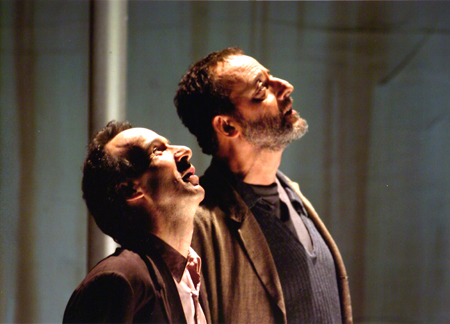|
Reviews of Recent Independent, Foreign, & Documentary Films in Theaters and DVD/Home Video
Directed by: Roberto Benigni. Written by: Benigni & Vincenzo Cerami. Produced by: Nicoletta Braschi. Director of Photography: Fabio Cianchetti. Edited by: Massimo Fiocchi. Music by: Nicola Piovani. Released by: Strand Releasing. Language: Italian with English subtitles. Country of Origin: Italy. 115 Minutes. Not Rated. With: Roberto Benigni, Nicoletta Braschi & Jean Reno.
Roberto Benigni tries to cross Fellini with Chaplin, and only achieves a drawn-out Saturday Night Live routine with the simplistic message to make love and poetry not war.
From its fantasy opening wedding scene set to a lovely new Tom Waits song, “You Can Never Hold Back Spring,” the rambling opening establishes several facets of Attilio’s (Benigni) life in Rome: he is a loving, if absent-minded, father to two teen daughters; a verbose poetry teacher who has had an affair with a colleague (Emilia Fox in a cameo); enmeshed in some sort of legal problem; and is obsessed with a beautiful writer, Vittoria (Nicoletta Braschi, Benigni’s wife and frequent costar), who wants nothing to do with him. The action shifts wildly from school to a La Strada-like circus to a writers’ conference, where Attilio meets up with the object of his affection and his old friend, Iraqi poet Fuad (Jean Reno).
Set very specifically in March 2003, the start of the invasion of Iraq becomes an excuse for a convoluted comic rescue mission. Attilio literally moves heaven and earth to care for his beloved when she is injured in Baghdad while working on Fuad’s biography. Playing the fool throughout, or just an Italian Mr. Magoo, Benigni mugs in a burned-out bus and a mine field, among other unlikely places, and engages in extended riffs on poetry (with a stream of visual and verbal references to Dante, Pound, Blake, etc.) that recall Robin Williams when he’s a guest on a late night talk show. Several characters in exasperation ask him to just shut up, and the viewer can’t help but agree.
Occasionally the absurd situations are amusing, but are repeated too frequently or go on too long. Then amidst the comedy is a jarring side story of Fuad’s increasing despair about the future of his country and the role of art.
The scenery, shot in Morocco, can be arresting, including lovely skies that are a point of departure for discussing Arabian Nights. But a destroyed sculpted arch over a desert highway is a too heavy-handed visual metaphor, recalling both the folly of Shelley’s poem Ozymandias and the downing of Saddam Hussein’s statues (his portraits still stare down from the walls of the ravaged Baghdad hospital where Vittoria lays comatose). The literary and film allusions continue as Attilio drags a wagon through the war zone like Brecht’s Mother Courage and is chased through the market like The Thief in Baghdad. Doubtless viewers can be occupied during the dreary scenes picking out the many other references, from the title on.
Veering around a zebra, ostrich, tiger, and snow, the fabulist conclusion back in Rome draws on both 8½ and The Wizard of Oz as Attilio’s dreams, fantasies and real life come together. Here, he reiterates to his daughters that how to tell a story is more important than the tale itself – would that Benigni had listened to his own advice. Nora Lee Mandel
|

